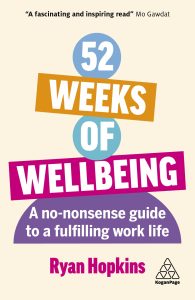By Ryan Hopkins, below, author of 52 Weeks of Wellbeing: A No-Nonsense Guide to a Fulfilling Work Life
 Forget “work-life balance.” It’s a myth. Technology has blurred the lines between work and home for a lot of us and for small and medium businesses, the implications are often unnoticed, but potentially damaging. Emails creep into evenings, to-do lists bleed into weekends, and the ever-present ping of notification erodes wellbeing for individuals and, ironically, productivity for the business. No one, despite common perception, is productive being plugged in constantly.
Forget “work-life balance.” It’s a myth. Technology has blurred the lines between work and home for a lot of us and for small and medium businesses, the implications are often unnoticed, but potentially damaging. Emails creep into evenings, to-do lists bleed into weekends, and the ever-present ping of notification erodes wellbeing for individuals and, ironically, productivity for the business. No one, despite common perception, is productive being plugged in constantly.
But here’s the good news: SMEs have unique strengths in this battle. You’re agile, adaptable, and close-knit (well you’re supposed to be anyway). Time to redefine what productivity means for your team. We are going to shift our focus to boundaries, not balance.
Start with leadership: Set the tone by establishing clear expectations around communication outside working hours. Lead by example – shut down your laptop, no ‘just one look’, or ‘one last email’ and encourage your team to do the same. Maybe one day we will emulate our French counterparts and will see a right to disconnect policy here in the UK, fingers crossed.
Digital Balance:
Tech can be the issue but also the solution. How happy, productive, healthy do you feel after three back-to-back meetings, not anymore. We all need to auto-schedule meetings to finish early. When we do this, we allow our brains to reset, our stress to dissolve, and we can actually save a lot of time, 4.8 work weeks per year actually (assuming six meetings per day and an average saving of 7.5 minutes). 7.5mins saved x six meetings per day x 235 the average working days per year / 36.4 the Office of National Statistics (59) average work week hours = 4.8 work weeks. Crazy right? Now imagine if a whole organisation did this, e.g. 50 people x 4.8 work weeks = 240 work weeks saved, which is equivalent to hiring five new full-time staff. Not bad eh.
Communication is key:
Openly discuss the challenges of digital overload. Regularly check in with your team, identify stressors, and collaboratively find solutions. If Sarah keeps sending emails at 23:32 and she has a partner and kids, don’t praise her work ethic, rather check why she feels she has to do this.
Analogue solutions to digital problems: if your laptop and phone are in the room you cannot be bothered. Simple. Suggest that your teams do not use laptops past a certain time and mute work notifications outside of work hours. Of course, there are times we have to burn the midnight oil, just not every day.
Celebrate disconnection:
Encourage employees to share their post-work activities, from family dinners to creative pursuits. Show that well-rounded lives lead to sharper minds and happier teams. Less praising for ‘going above and beyond’, more ‘nailed the project, while living outside of work’.
Remember, productivity isn’t about working every waking hour. Sure, maybe you can drive your team to work longer, to create one more widget, but if that means attrition and sickness, it isn’t worth it at all, not for the business or the people. It’s about working smarter, with focus and purpose. By prioritizing boundaries, fostering open communication, and prioritising and celebrating a life beyond work, your business can and will thrive in the digital age.
Bonus Tip: Remember, what works for one does not work for another. So less solutions, one-size-fits-all, webinars and more flexibility, trust, space, time, psychological safety – you get me.
 Ryan Hopkins is the author of 52 Weeks of Wellbeing: A No-Nonsense Guide to a Fulfilling Work Life (Kogan Page, out now), Deloitte’s former Future of Wellbeing Leader and now Chief Impact Officer at pioneering digital wellbeing platform JAAQ
Ryan Hopkins is the author of 52 Weeks of Wellbeing: A No-Nonsense Guide to a Fulfilling Work Life (Kogan Page, out now), Deloitte’s former Future of Wellbeing Leader and now Chief Impact Officer at pioneering digital wellbeing platform JAAQ


